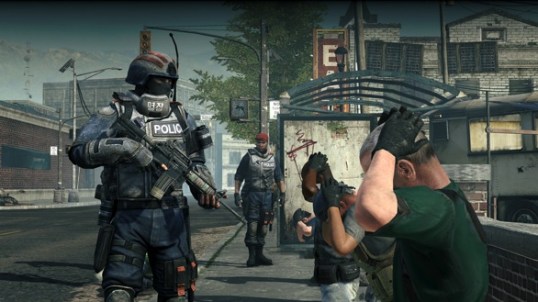That’s just the backdrop, though. Combat manipulates you in a different way. Many of the missions seem to be designed to make you feel underpowered and outmatched, only to eventually give you the tools to orchestrate an orgy of revenge on the KPA enemies who’ve been kicking your ass. Unfortunately, the shooting experience in Homefront doesn’t do much to distinguish itself for other similar games. There’s no sticky cover in the game, which is to say there’s no way to lean against an object and automatically peek in and out. While that makes it feel out of step with just about every other FPS out there, it feels more like a decision than a misstep. Having to stick your head out to shoot at KPA enemies feels more dangerous without the ability to peer around corners as in other games. But, too many other parts of the experience fall apart and those are unmistakably missteps. The enemy AI is stone-dumb, often standing out in the open to fire at you, which makes them sitting ducks, and staying stock still when grenades are thrown their way. The aiming often feels imprecise and the guns lack personality. Almost all of the rifles feel the same and too few weapons make you want to hold on to them. That’s important because if the character you control exists only as a cipher–as does Jacobs–then something in the gameplay needs to speak out to you. Guns and other weapons are characters in a first-person shooter. The sequences where you control Goliath–the semi-autonomous super-tank–shine, but they’re few and far in between. (The Long Goodbye: Halo: Reach Review)
On the narrative front, the characters mostly conform to type. Rebel leader Boone is compassionate and resolute, female soldier Rianna voices regret over the killing the resistance has to do amd Connor’s the hot-headed “America, F— Yeah” Rambo-style patriot. And, sometimes, the dialogue and voicework dips below that of b-movie material. As enemy soldiers burn in a fiery gunfight, Connor quips, “I thought I smelled Korean barbecue.” Rianna reacts with disgust but it’s entirely probable that more than a few players will laugh at that line. But, overall, you learn next to nothing about Jacobs and why he was holed up in a squat when the KPA came. THQ’s made a big deal about having John Milius–screenwriter of jingoistic ’80s action movies Red Dawn and Rambo–on board for plot duty, but there’s no surprise or pull to the proceedings.
If the technology were extant in 1942, the shooters that would’ve been made then would probably feel a lot like Homefront does now. It’s video game as propaganda, filled with righteous indignation and reassuring home truths about the American fighting spirit. Our enemies are ignoble and deserve to die. But the experience is about as substantial as a pamphlet, which isn’t helped by how short the single-player portion is. You want to learn more about the world but there’s not a lot of depth. Homefront starts off strong but the wonkiness of the gameplay and the predictability of the plot and characters never fires you up the way you want to. For a game that sets out to manipulate your emotions in its world-building, the lack of complexity is too big a weakness to overcome.
Official Techland Score: 7.5 out of 10


